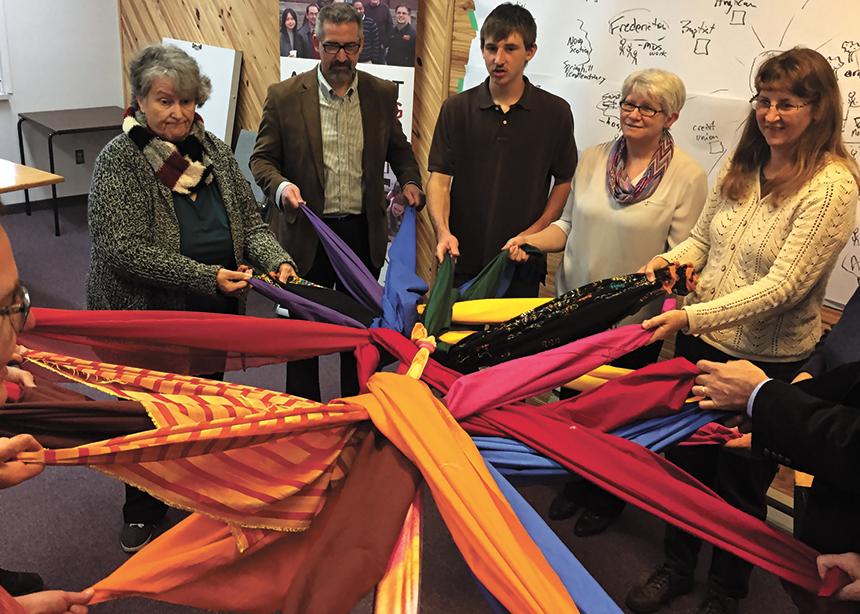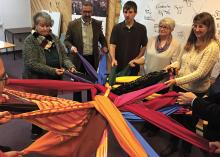Knowledge is truly amazing. When you really know something, it can light you up, it can discombobulate you, it can put you in touch with your body or it can make you feel connected to a much bigger body.
In the 21st century, we invent new professions in the service of “knowledge translation” and “knowledge mobilization,” and we develop vast infrastructures for multilateral exchange within the “knowledge economy.” We talk about knowledge as something to be constructed, deconstructed, crowdsourced and “stored in the cloud.” In the context of the church, how can we “store” knowledge about the Word who became flesh?
In the last few years, I have been involved in a project of knowledge embodiment. On the surface, the project is known as the Anabaptist Learning Workshop, a program of Mennonite Church Eastern Canada in cooperation with Conrad Grebel University College. Launched in 2015, our program offers workshops, conferences and other learning events in various locations throughout Eastern Canada. The goal of the workshops is to bring people together to explore the intersection of Anabaptist-Christian faith and contemporary life, and to do this through participatory and experiential learning.
Workshops have included many ways of inhabiting and being inhabited by knowledge. Participants have explored spiritual caregiving strategies by making and comparing Play-Doh sculptures. They have reflected on community development ministries by thinking with their hands—and with their whole bodies—as they weave bands of cloth together. They have grappled with theological differences by chopping vegetables, filling jars with kimchi, and letting the kimchi fill them with new insights about Christian diversity. They have learned about faith by baking bread, canoeing through the wilderness, and practising new song-leading techniques. They have read the Bible as a community of interpreters and, therefore, they have been “em-bodied”—made into a body—by the Word.
Of course, non-academic educational programs like the Anabaptist Learning Workshop are not the only ones doing this sort of knowledge embodiment. There are academic courses in which students examine key concepts by moving away from their desks and doing interactive activities. Artists, musicians and actors learn their respective trades in a very embodied fashion. And, of course, there are many workplaces in which employees receive on-the-job training through hands-on learning.
In the context of the church, embodied learning is way more than skin deep! The Book of Ephesians contains a bewildering prayer for each follower of Jesus, namely, that you would “know the love of Christ that surpasses knowledge, so that you may be filled with all the fullness of God” (3:19).
Amazing enough that you are supposed to know something that goes beyond knowledge, but also that you should be jam-packed with the fullness of God? Sounds very good, but overwhelming!
This takes us back to the body again, but in the sense of the body of learners, the group of learners. In our program, one of the consistent pieces of feedback we receive is appreciation for being able to learn together as a community. When people feel like they are working together, playing together or puzzling their way through difficult questions, they have a keen sense of camaraderie and, therefore, they usually do not get overwhelmed.
What is the role of the instructor in this situation? When a workshop goes particularly well, participants often give credit to the instructors for sharing their knowledge and experience while also enabling participants to learn from their own wisdom. The role of instructors becomes one of listening and reflecting back what they have heard, facilitating interactive learning activities and tailoring the workshop to the interests of those who are present.
Can embodied knowledge lead us to do church in new ways, especially in the face of such things as the climate crisis?
In our program, we have experimented with different curricula and with various ways of doing experiential learning. Embodying knowledge can sometimes be as simple as standing up and moving the chairs out of the way; indeed, the simple act of standing up can increase the flow of blood to the brain by more than 10 percent!
Nevertheless, being faithful involves more than being invigorated! Ephesians 3 talks about the love of Christ that surpasses knowledge. On the local level, I wonder what lessons your congregation has learned about embodying that love. At the planetary level, what lessons do we need to learn about standing up, increasing the blood flow and following Jesus in a changing world?
Matthew Bailey-Dick is the coordinator of the Anabaptist Learning Workshop and a member of Erb Street Mennonite Church, Waterloo, Ont.
Related stories:
Lessons from Narnia
Seminary short course offers congregations tools for engaging conflict
Conversations about sex and spirituality impact Rockway students
Canadian post-secondary schools announce enrolment figures
CMU recognizes distinguished alumni with 2019 awards
Reclaiming the value of health-care assistants



Add new comment
Canadian Mennonite invites comments and encourages constructive discussion about our content. Actual full names (first and last) are required. Comments are moderated and may be edited. They will not appear online until approved and will be posted during business hours. Some comments may be reproduced in print.